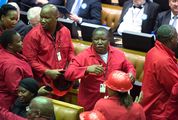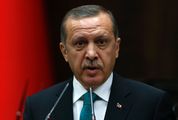Source:

BUSINESS DAY TV: MTN has had to ‘act as a home affairs department too’
by Transcript service,
2016-03-16 06:29:55.0
PHUTHUMA Nhleko was the nonexecutive director and chairman of MTN Group and is now the acting executive chairman.
BUSINESS DAY TV: MTN today described 2015 as the most difficult year in its 21-year history. Joining me now on News Leader to discuss the year and also the prospects for 2016 is Phuthuma Nhleko, executive chairman of the company.
Phuthuma ... if we can start off with Nigeria because that’s where the focus has been and that’s the huge weight on your shares, you said things could have been done differently in Nigeria, in the presentation this morning. But the question is and it came up about risk management and why MTN is the only company that has received a massive fine for the whole SIM card registration process, whereas your competitors haven’t. So you clearly must have dropped the ball in a spectacular fashion?
PHUTHUMA NHLEKO: Yes it’s a little bit ... far more complex than that, firstly as I indicated during my presentation, MTN’s scale in Nigeria relative to the other operators is pretty significant. Secondly, not only from a scale perspective but also our presence in a geographic sense is much wider. Thirdly, there is a lack of appreciation, and I say that in a very jocular manner, but I think it’s a good description ... that we are trying to be an operator and in some respects a department of home affairs because really what you have in your ID card, and you can walk into a CNA and just get it done, we have to do five steps back on that. We have to effectively take your biometrics for the first time and so on. And then there (are) all sorts of complications to do ... well have you completed all the fields, is there something missing, and so on.
So the situation is very complex. However, could they have moved faster in disconnecting them earlier? The answer is yes but I suspect in giving the management there the benefit of the doubt, they felt: “Well ... we’re going to lose all this revenue and we’re going to lose it because maybe one field is missing where the person has not put their address properly, but 90% of the information is correct.” So there was a bit of that grey area.
Did the other operators act precisely the way that we did? Did they fulfil the same standards? That is a difficult question to answer because I don’t know for a fact but I find it difficult to believe, right, that given the amount of effort that MTN has put into the registration process, and we’ve got 30,000 scanners and so on, that there was somebody who was considerably ahead of us. So I can only speculate.
BDTV: You said today that you believe that you will be equally treated in Nigeria and you expect to be equally treated. So now you’ve set aside a provision of R9bn odd, for a fine, is that pretty much what you would expect to pay if you were equally treated or treated equitably shall we say by the communication regulator?
PN: If we are treated equitably, my own view is that obviously that ought to be consistent with what happens globally on fines of this nature where the infringement and the proportionality of the fine bear some sort of relation. That’s what I would expect. What I expect and what the reality is are invariably two different things. So it is very important to say that we don’t really want to get into the numbers because we are in discussion, because we report our results we are obliged to put a provision for something that’s material. And that provision was arrived at through management’s judgement, requirements of IFRS (International Financial Reporting Standards) to the satisfaction of the auditors, but that does not mean by any stretch that that is therefore the final number. And I cannot overemphasise that. If our results were four months from now, I guess we’d have more latitude but we had to give our results and our results needed to have a number in it and that’s where we are.
BDTV: Just another thing that you said in the presentation, you also joked, on your communication with your stakeholders, and you said “lest we be regarded as being uncommunicative”, but MTN has been uncommunicative, and that was probably the biggest issue that the market has had with you initially, was that we just didn’t have information from MTN. Have you learnt from this? Is it something that you are prepared to address within the company to be more transparent?
PN: Yes ... I think that’s highly subjective. I can fully appreciate that there was frustration around the fact that we weren’t giving A to Z of the fine and exactly how it happened, who did what, etcetera. And I can appreciate that perspective but on the other hand I guess people also have to appreciate that when you’ve got a highly contentious matter that is going to court, that is very legal and where the regulator is highly sensitive to what is said, we didn’t want to be seen to be giving what somebody else may regard as a biased view of MTN. So we tried our best that every time there was movement on the matter, we took out a Sens announcement that was probably legally advised and so on. And we do this to this day. We have done the results today, we have given more colour and, of course, the situation is slightly different now in the sense that the judge has said, go and find ...
BDTV: Each other?
PN: Try and find each other before 18 March if you can. That was not the case at all, the utmost fear was acrimonious shortly after the fine. So I do appreciate the frustration and we all learn from these things but I’m just trying to give a different perspective that there were some extenuating circumstances that made this a pretty complex matter.
BDTV: Just, I hate to harp on Nigeria but there are 4.5-million more deregistrations that took place before the end of February, were those done in time? Will there be any other penalties...?
PN: No, those were done in time, they were done in a timeframe that is agreed with the regulator, because as much as I have been trying to humbly “inform and educate the public on the complexity of the issue”, I think in speaking to the regulator ... or at least I’d like believe that even they are starting to appreciate that some of the standards that they are asking of us, in that environment, would be difficult even amongst the most sophisticated countries with all the equipment and biometrics and so on. So we got latitude to disconnect those a bit later, yes. So it was with their blessing so to speak.
BDTV: And lastly, 2016 ... 2015 was a dreadful year for MTN, you’ve budgeted R31bn in Capex, you said SA seems to be going better, you hopefully will get money out of Iran, so will 2016 be a better year and also it relates to the fact that you do intend to still pay a dividend to shareholders?
PN: Yes, we certainly hope so. How the matter in Nigeria gets resolved is going to be quite impactful on whether we have a positive year by and large. How the lifting of sanctions continues and how it gets eased, is going to be quite impactful on where we are and that R31bn as I indicated is a very conservative number. I think one of the analysts was quite right that we are probably going to have to up that significantly in SA and Nigeria to remain very competitive. But we thought we would give some sort of guidance.
PHUTHUMA Nhleko was the nonexecutive director and chairman of MTN Group and is now the acting executive chairman.
BUSINESS DAY TV: MTN today described 2015 as the most difficult year in its 21-year history. Joining me now on News Leader to discuss the year and also the prospects for 2016 is Phuthuma Nhleko, executive chairman of the company.
Phuthuma ... if we can start off with Nigeria because that’s where the focus has been and that’s the huge weight on your shares, you said things could have been done differently in Nigeria, in the presentation this morning. But the question is and it came up about risk management and why MTN is the only company that has received a massive fine for the whole SIM card registration process, whereas your competitors haven’t. So you clearly must have dropped the ball in a spectacular fashion?
PHUTHUMA NHLEKO: Yes it’s a little bit ... far more complex than that, firstly as I indicated during my presentation, MTN’s scale in Nigeria relative to the other operators is pretty significant. Secondly, not only from a scale perspective but also our presence in a geographic sense is much wider. Thirdly, there is a lack of appreciation, and I say that in a very jocular manner, but I think it’s a good description ... that we are trying to be an operator and in some respects a department of home affairs because really what you have in your ID card, and you can walk into a CNA and just get it done, we have to do five steps back on that. We have to effectively take your biometrics for the first time and so on. And then there (are) all sorts of complications to do ... well have you completed all the fields, is there something missing, and so on.
So the situation is very complex. However, could they have moved faster in disconnecting them earlier? The answer is yes but I suspect in giving the management there the benefit of the doubt, they felt: “Well ... we’re going to lose all this revenue and we’re going to lose it because maybe one field is missing where the person has not put their address properly, but 90% of the information is correct.” So there was a bit of that grey area.
Did the other operators act precisely the way that we did? Did they fulfil the same standards? That is a difficult question to answer because I don’t know for a fact but I find it difficult to believe, right, that given the amount of effort that MTN has put into the registration process, and we’ve got 30,000 scanners and so on, that there was somebody who was considerably ahead of us. So I can only speculate.
BDTV: You said today that you believe that you will be equally treated in Nigeria and you expect to be equally treated. So now you’ve set aside a provision of R9bn odd, for a fine, is that pretty much what you would expect to pay if you were equally treated or treated equitably shall we say by the communication regulator?
PN: If we are treated equitably, my own view is that obviously that ought to be consistent with what happens globally on fines of this nature where the infringement and the proportionality of the fine bear some sort of relation. That’s what I would expect. What I expect and what the reality is are invariably two different things. So it is very important to say that we don’t really want to get into the numbers because we are in discussion, because we report our results we are obliged to put a provision for something that’s material. And that provision was arrived at through management’s judgement, requirements of IFRS (International Financial Reporting Standards) to the satisfaction of the auditors, but that does not mean by any stretch that that is therefore the final number. And I cannot overemphasise that. If our results were four months from now, I guess we’d have more latitude but we had to give our results and our results needed to have a number in it and that’s where we are.
BDTV: Just another thing that you said in the presentation, you also joked, on your communication with your stakeholders, and you said “lest we be regarded as being uncommunicative”, but MTN has been uncommunicative, and that was probably the biggest issue that the market has had with you initially, was that we just didn’t have information from MTN. Have you learnt from this? Is it something that you are prepared to address within the company to be more transparent?
PN: Yes ... I think that’s highly subjective. I can fully appreciate that there was frustration around the fact that we weren’t giving A to Z of the fine and exactly how it happened, who did what, etcetera. And I can appreciate that perspective but on the other hand I guess people also have to appreciate that when you’ve got a highly contentious matter that is going to court, that is very legal and where the regulator is highly sensitive to what is said, we didn’t want to be seen to be giving what somebody else may regard as a biased view of MTN. So we tried our best that every time there was movement on the matter, we took out a Sens announcement that was probably legally advised and so on. And we do this to this day. We have done the results today, we have given more colour and, of course, the situation is slightly different now in the sense that the judge has said, go and find ...
BDTV: Each other?
PN: Try and find each other before 18 March if you can. That was not the case at all, the utmost fear was acrimonious shortly after the fine. So I do appreciate the frustration and we all learn from these things but I’m just trying to give a different perspective that there were some extenuating circumstances that made this a pretty complex matter.
BDTV: Just, I hate to harp on Nigeria but there are 4.5-million more deregistrations that took place before the end of February, were those done in time? Will there be any other penalties...?
PN: No, those were done in time, they were done in a timeframe that is agreed with the regulator, because as much as I have been trying to humbly “inform and educate the public on the complexity of the issue”, I think in speaking to the regulator ... or at least I’d like believe that even they are starting to appreciate that some of the standards that they are asking of us, in that environment, would be difficult even amongst the most sophisticated countries with all the equipment and biometrics and so on. So we got latitude to disconnect those a bit later, yes. So it was with their blessing so to speak.
BDTV: And lastly, 2016 ... 2015 was a dreadful year for MTN, you’ve budgeted R31bn in Capex, you said SA seems to be going better, you hopefully will get money out of Iran, so will 2016 be a better year and also it relates to the fact that you do intend to still pay a dividend to shareholders?
PN: Yes, we certainly hope so. How the matter in Nigeria gets resolved is going to be quite impactful on whether we have a positive year by and large. How the lifting of sanctions continues and how it gets eased, is going to be quite impactful on where we are and that R31bn as I indicated is a very conservative number. I think one of the analysts was quite right that we are probably going to have to up that significantly in SA and Nigeria to remain very competitive. But we thought we would give some sort of guidance.






















Login OR Join up TO COMMENT